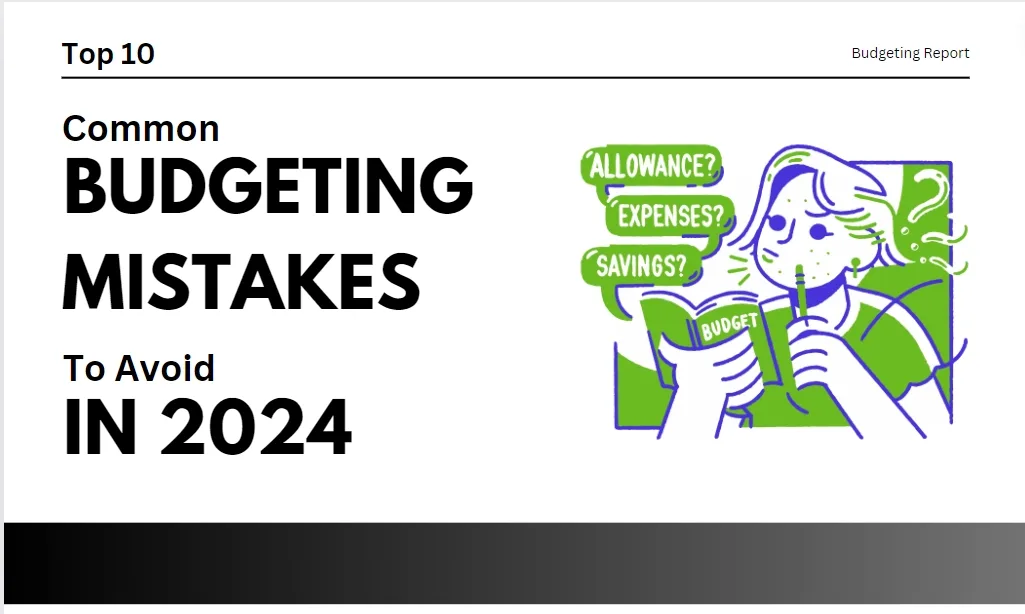Budgeting is a crucial aspect of financial planning, but it’s not always easy to get it right. In 2024, as we navigate the ever-evolving financial landscape, it’s important to be aware of the common budgeting mistakes that can derail your progress towards financial stability and growth. In this article, we’ll explore the top 10 budgeting blunders to steer clear of in the coming year.
Why Budgeting Matters
Creating and sticking to a budget is crucial for:
- Financial Control: Understanding your income and expenses empowers you to make informed financial decisions.
- Debt Reduction: Effective budgeting can help you pay off debt faster.
- Saving Goals: Allocate funds towards savings and investments for future financial security.
- Avoiding Overspending: A budget prevents impulsive purchases and helps you prioritize spending.

1. Not Having a Budget at All
One of the most common budgeting mistakes is not having a budget in the first place. Without a clear plan for your income and expenses, it’s easy to overspend and lose track of where your money is going. In 2024, make it a priority to create a budget that works for your unique financial situation.
2. Failing to Track Expenses
Tracking your expenses is essential for creating an accurate budget. If you don’t know how much you’re spending on things like groceries, entertainment, and bills, it’s impossible to create a realistic budget. In 2024, make it a habit to track your expenses regularly, either through a budgeting app or by keeping a spending journal.
3. Underestimating Expenses
Another common budgeting mistake is underestimating your expenses. If you don’t account for unexpected costs or seasonal expenses, you may find yourself coming up short at the end of the month. In 2024, be sure to factor in things like car repairs, medical bills, and holiday spending when creating your budget.
4. Not Prioritizing Savings
Saving money should be a top priority when it comes to budgeting. If you don’t allocate funds for savings, it’s easy to let that money slip away. In 2024, make sure to set aside a portion of your income for savings, whether it’s for an emergency fund, a down payment on a house, or retirement.
5. Relying on Credit Cards
Using credit cards to cover expenses can be a slippery slope. If you’re not careful, you can quickly accumulate debt and end up paying more in interest than you can afford. In 2024, try to limit your use of credit cards and focus on paying off any existing balances.
6. Not Adjusting Your Budget
Your financial situation is likely to change over time, so it’s important to adjust your budget accordingly. If you get a raise, have a baby, or move to a new city, your budget will need to be updated. In 2024, be sure to review and adjust your budget regularly to ensure that it still meets your needs.
7. Impulse Spending
Impulse spending can quickly derail your budgeting efforts. If you’re not careful, those little purchases here and there can add up quickly. In 2024, try to be more mindful of your spending and avoid making purchases on a whim.
8. Not Having a Plan for Extra Income
If you receive a windfall, such as a tax refund or a bonus from work, it’s important to have a plan for how to use that money. If you don’t, it’s easy to spend it on things you don’t really need. In 2024, make sure to allocate any extra income towards your financial goals, such as paying off debt or building up your savings.
9. Neglecting to Review Your Budget
Reviewing your budget regularly is essential for keeping your finances on track. If you don’t review your budget, it’s easy to let things slide and end up overspending. In 2024, make it a habit to review your budget at least once a month to ensure that you’re staying on track.
10. Not Seeking Professional Help
If you’re struggling with budgeting or have complex financial needs, it may be worth seeking the help of a financial professional. A financial advisor can help you create a personalized budget and provide guidance on achieving your financial goals. In 2024, don’t be afraid to ask for help if you need it.By avoiding these common budgeting mistakes in 2024, you’ll be well on your way to achieving financial success. Remember, budgeting is an ongoing process, so be patient with yourself and don’t be afraid to make adjustments as needed. And if you’re looking for more tips on budgeting in 2024, be sure to check out our article “What Are The Best Tools For Budgeting In 2024“.
FAQs
- How often should I review my budget?
- It’s recommended to review your budget at least once a month to ensure that you’re staying on track.
- What’s the best way to track my expenses?
- There are many budgeting apps and tools available that can help you track your expenses, such as Mint, YNAB, and PocketGuard. You can also keep a spending journal or use a spreadsheet to track your expenses manually.
- How much should I be saving each month?
- The amount you should save each month depends on your financial goals and situation. As a general rule of thumb, it’s recommended to save at least 10-15% of your income for retirement and have an emergency fund that covers 3-6 months’ worth of expenses.
- Is it okay to use credit cards for budgeting?
- Using credit cards for budgeting can be risky if you’re not careful. It’s important to pay off your balances in full each month to avoid accumulating debt and paying interest.
- When should I seek the help of a financial advisor?
- If you have complex financial needs, such as estate planning, tax planning, or retirement planning, it may be worth seeking the help of a financial advisor. A financial advisor can also provide guidance on creating a personalized budget and achieving your financial goals.
